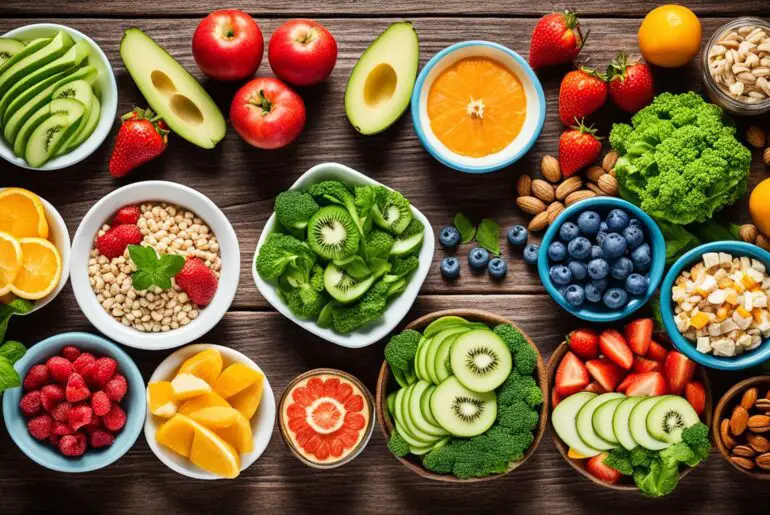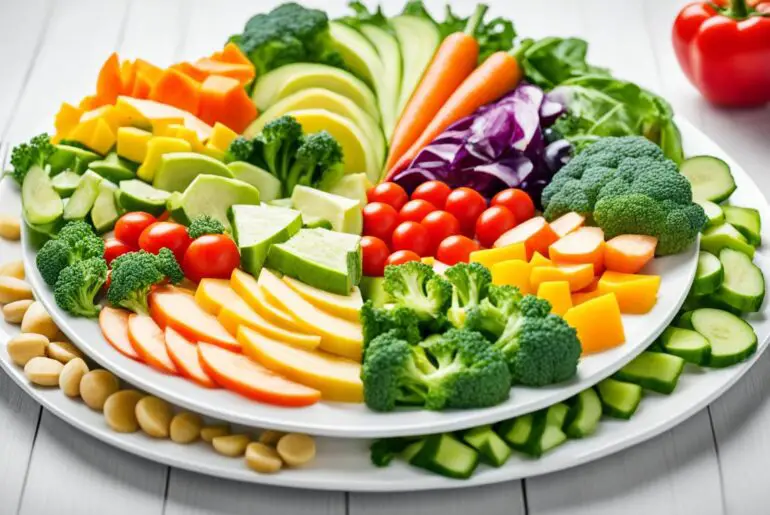Did you know that the HCG diet promises rapid weight loss of 1–2 pounds (0.5–1 kg) per day, all without hunger? It sounds too good to be true, and that’s because it is. The HCG diet, which involves injecting the hormone hCG and severely restricting calories, has been deemed illegal and dangerous by the FDA. Let’s explore the different phases of this diet and uncover the truth behind its claims.
Key Takeaways:
- The HCG diet promises rapid weight loss, but it is considered unsafe and ineffective by the FDA.
- The HCG hormone, human chorionic gonadotropin, is produced during early pregnancy and has been used to treat fertility issues.
- Scientific studies have concluded that weight loss on the HCG diet is primarily due to calorie restriction, not the HCG hormone itself.
- The HCG diet can lead to muscle loss, decreased metabolism, and potential health risks.
- There are safer and more sustainable methods for weight loss and maintenance.
What is hCG?
hCG, or human chorionic gonadotropin, is a hormone produced in the early stages of pregnancy. It plays a crucial role in maintaining the production of essential pregnancy hormones and is widely used as a marker in home pregnancy tests. Not only that, but hCG has also been utilized for treating fertility issues in both men and women. However, it’s essential to note that elevated blood levels of hCG hormone can sometimes indicate certain types of cancer.
In 1954, a British doctor named Albert Simeons first proposed using hCG as a potential tool for weight loss. This sparked considerable interest in the hormone’s possible function in facilitating weight management.
The Science behind hCG and Weight Loss
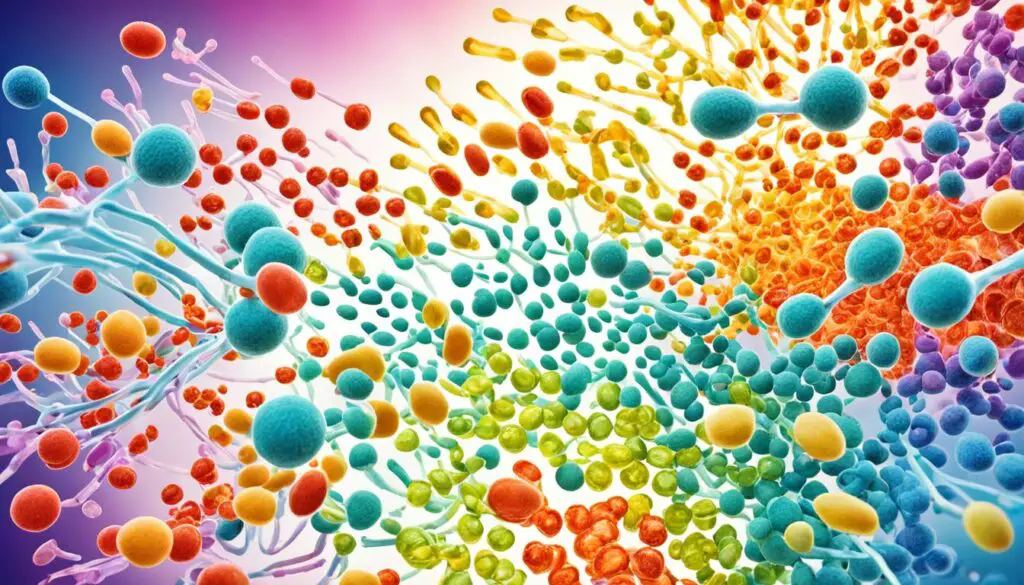
Proponents of the hCG diet claim that it boosts metabolism and helps with fat loss without hunger. However, scientific studies have concluded that weight loss achieved on the hCG diet is primarily due to the drastic calorie restriction and not the hCG hormone itself.
Multiple studies have shown that weight loss is similar between individuals on a calorie-restricted diet with hCG injections and those on a calorie-restricted diet with placebo injections. Furthermore, the hCG hormone has not been found to significantly reduce hunger.
It is important to understand that the weight loss experienced on the hCG diet is mainly due to the reduced calorie intake, not the effects of the hCG hormone.
The Mechanisms of Weight Loss on the hCG Diet
When following the hCG diet, individuals consume a very low-calorie diet, typically around 500 calories per day. This extreme calorie restriction leads to rapid weight loss. The hCG hormone itself does not directly cause weight loss but may have indirect effects on appetite and metabolism.
The calorie restriction on the hCG diet triggers a state of energy deficit, forcing the body to use stored fat as an energy source. This results in fat loss, which contributes to overall weight loss. However, it is important to note that this type of very low-calorie diet can also lead to muscle loss.
Additionally, the hCG hormone may have some impact on hunger and satiety signals in the brain, but the evidence is limited. Some studies suggest that hCG may have a slight effect on appetite suppression, but the overall hunger reduction experienced by individuals on the hCG diet is likely due to the low-calorie intake.
In conclusion, the weight loss achieved on the hCG diet is primarily a result of the drastic calorie restriction rather than any specific effects of the hCG hormone itself. While the hCG diet may lead to rapid weight loss, it is important to consider the potential risks and consult with a healthcare professional before starting any weight loss program.
| Weight Loss Mechanisms on the hCG Diet | Scientific Evidence |
|---|---|
| Calorie Restriction | Multiple studies have shown that weight loss is primarily a result of the reduced calorie intake on the hCG diet. |
| HCG Hormone Effects | Scientific evidence is limited and suggests that the hCG hormone does not significantly reduce hunger or directly cause weight loss. |
| Fat Loss | The extreme calorie restriction on the hCG diet forces the body to use stored fat as an energy source, resulting in fat loss. |
| Muscle Loss | Very low-calorie diets like the hCG diet can lead to muscle loss, which may impact long-term weight loss and metabolism. |
Effects on Body Composition
Severe calorie restriction, such as that in the hCG diet, can have significant effects on body composition. One of the main concerns is the potential for muscle loss, which can negatively impact overall health and metabolism.
Proponents of the hCG diet claim that the hCG hormone prevents muscle loss and promotes an anabolic state. However, there is no scientific evidence to support these claims. In fact, studies have shown that low-calorie diets, like the hCG diet, can lead to a decrease in muscle mass.
Muscle loss is a significant concern because it plays a crucial role in maintaining a healthy body composition. Muscle tissue is metabolically active and burns more calories at rest compared to fat tissue. Therefore, a decrease in muscle mass can result in a slower metabolism, making it harder to maintain weight loss in the long run.
Moreover, severe calorie restriction can cause the body to break down muscle tissue for energy, leading to further muscle loss. This can be especially concerning for those looking to improve their body composition and increase muscle mass.
The hCG diet’s low-calorie approach may result in initial weight loss, but it is important to consider the overall impact on body composition. Losing muscle mass without addressing other factors, such as strength training and adequate protein intake, can have negative long-term consequences.
It’s important to note that sustainable weight loss and a healthy body composition are best achieved through a balanced approach that includes regular exercise, a nutritious diet, and a focus on overall lifestyle changes.
Comparing the Effects of hCG Diet and Balanced Approach on Body Composition
| hCG Diet | Balanced Approach | |
|---|---|---|
| Effect on Muscle Mass | Can lead to muscle loss due to severe calorie restriction | Promotes muscle preservation and development through strength training and adequate protein intake |
| Effect on Metabolism | May result in a slowed metabolism due to muscle loss | Supports a healthy metabolism through increased muscle mass and regular exercise |
| Long-Term Sustainability | Difficult to maintain weight loss and healthy body composition without addressing underlying factors | Promotes sustainable weight loss and maintenance by adopting a balanced lifestyle approach |
The Rules of the HCG Diet
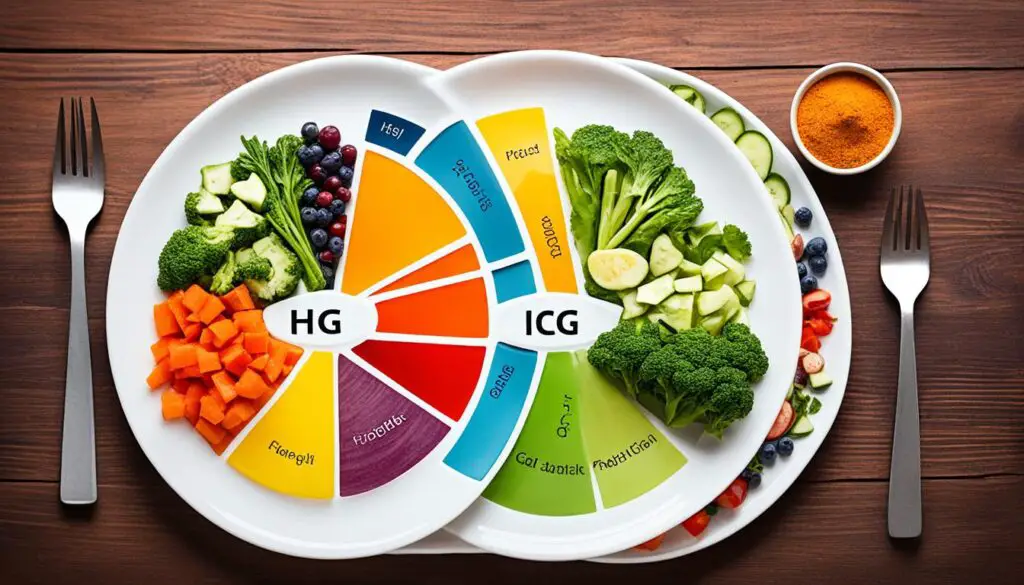
The HCG diet follows a structured approach with three distinct phases: the loading phase, the weight loss phase, and the maintenance phase. Each phase has its own guidelines to ensure optimal results and proper progression towards your weight loss goals.
1. Loading Phase
The loading phase typically lasts for two days and serves to prepare your body for the calorie restriction that follows. During this phase, you will take hCG injections and consume high-fat, high-calorie foods. This phase helps to replenish your body’s glycogen stores and create a foundation for the subsequent weight loss phase.
2. Weight Loss Phase
The weight loss phase is the core of the HCG diet and can last from 3 to 6 weeks, depending on your goals and individual progress. During this phase, you will continue taking hCG injections alongside a strict 500-calorie-per-day meal plan. The low-calorie intake is crucial for triggering rapid weight loss and allows your body to tap into stored fat for energy. It is important to strictly follow the prescribed meal plan and avoid any deviations to maximize your weight loss potential.
3. Maintenance Phase
After completing the weight loss phase, you will enter the maintenance phase, which typically lasts for three weeks. This phase does not involve hCG injections and focuses on gradually increasing your food intake while still maintaining weight loss. You will gradually increase your calorie intake to 1500-2000 calories per day. However, it is important to avoid sugar and starch during this phase to prevent weight regain and stabilize your new weight.
By following these three phases of the HCG diet, you can experience significant weight loss while ensuring your body receives the necessary nutrition and support throughout the process.
Whether you are in the loading, weight loss, or maintenance phase, it is crucial to stay disciplined and focused on your goals. The structured approach of the HCG diet, coupled with the hCG injections and calorie restriction, can help you achieve remarkable weight loss results. However, it is essential to consult with a healthcare professional before starting any weight loss program to ensure it is suitable for your specific needs and medical history.
Scam Products on the Market
When searching for hCG products online, it’s important to be cautious of scams and false claims. Many products labeled as homeopathic hCG do not contain any real hCG hormone. Genuine hCG, typically administered through injections, is only available with a valid doctor’s prescription.
Unlike genuine hCG, homeopathic products are unregulated and may contain unknown ingredients. These over-the-counter (OTC) hCG products have raised concerns regarding their safety and efficacy. The Food and Drug Administration (FDA) has voiced skepticism about the hCG diet and these OTC hCG products.
The Difference Between Genuine hCG and Homeopathic hCG
Genuine hCG products are prescribed for specific medical conditions, such as fertility issues, under the guidance of a healthcare professional. They undergo rigorous testing and adhere to strict regulations to ensure quality and safety.
Homeopathic hCG products, on the other hand, are labeled as homeopathic remedies and are not subject to the same regulations as genuine hCG. These products are diluted to the point where they often contain no traces of the hormone. As a result, they have not been proven effective for weight loss or any other health benefits.
The Risks of OTC hCG Products
Because OTC homeopathic hCG products are unregulated, they may contain undisclosed ingredients that could be harmful to your health. It’s crucial to exercise caution when considering these products from unfamiliar sources.
Additionally, relying on unregulated OTC hCG products may not provide the desired weight loss results. The hCG diet itself, even when using genuine hCG, has been criticized for its extreme calorie restriction and potential risks.
It is always recommended to consult with a healthcare professional before starting any weight loss program or using hCG products to ensure your safety and well-being.
| Comparison of Genuine and Homeopathic hCG Products | |
|---|---|
| Genuine hCG Products | Homeopathic hCG Products |
| Prescribed by a healthcare professional | Not regulated by any authority |
| Undergo rigorous testing for safety and efficacy | Do not undergo any testing |
| Contain real hCG hormone | Often contain no traces of hCG |
| Used for specific medical conditions | Marketed as weight loss aids |
Safety and Side Effects

When considering the hCG diet, it is essential to understand the safety concerns and potential side effects associated with this weight loss approach. The U.S. Food and Drug Administration (FDA) has not approved hCG as a weight loss aid and has expressed concerns about the safety of the hCG diet and over-the-counter hCG products.
The hCG diet involves a drastic calorie restriction, typically around 500 calories per day, which can lead to various side effects. Some individuals may experience headaches, depression, fatigue, and discomfort due to hunger. In rare cases, the severe calorie restriction of the diet can even lead to the formation of blood clots.
It is crucial to consult with a healthcare professional before embarking on any weight loss program, including the hCG diet. They can evaluate your overall health, discuss potential risks, and provide guidance based on your individual circumstances.
Potential Side Effects of the hCG Diet:
- Headaches
- Depression
- Fatigue
- Hunger
- Blood clots (rare cases)
By working closely with a healthcare professional, you can ensure your safety and minimize the risk of any adverse effects. Remember that sustainable weight loss involves adopting a well-rounded and balanced approach that considers your overall health and well-being.
Next, let’s take a closer look at the scam products on the market that claim to be related to the hCG diet.
The Bottom Line
The hCG diet is a weight loss method that involves extreme calorie restriction, but it is an unsustainable and potentially unsafe approach. Scientific studies have shown that the primary factor driving weight loss on the hCG diet is the low calorie intake, rather than the hCG hormone itself. While the diet may result in rapid weight loss, it is important to consider the potential risks and long-term sustainability.
Instead of the hCG diet, there are plenty of effective and safer alternatives for losing weight and maintaining a healthy lifestyle. Consulting with a doctor, dietitian, or nutritionist can help individuals determine a suitable weight loss method that aligns with their goals and needs.
Phase 3 Maintenance Phase
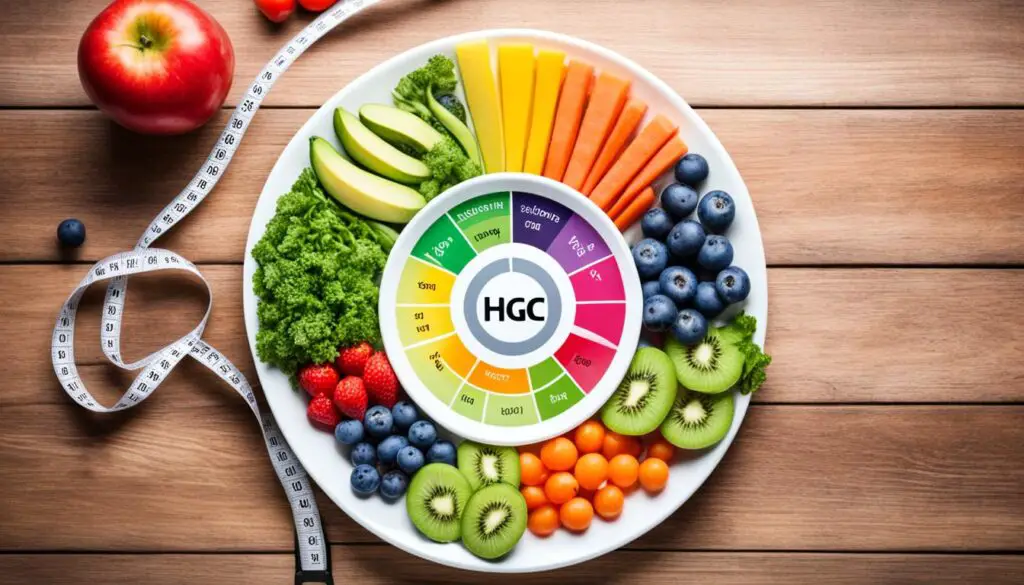
After completing the weight loss phase of the hCG diet, it’s time to transition into phase 3 – the maintenance phase. This phase is crucial for maintaining the weight loss you have achieved and establishing healthy habits for the long term. During phase 3, you will gradually increase your calorie intake and focus on making smart food choices to sustain your weight loss.
During the maintenance phase, you should aim to consume around 1500 to 2000 calories per day. This increase in calorie intake is important to prevent your body from going into starvation mode and to support your metabolism. However, it’s crucial to avoid consuming excessive amounts of sugar and starch during this phase, as they can easily lead to weight gain.
It’s recommended to weigh yourself daily during the maintenance phase to track your progress and make adjustments if necessary. If you notice your weight fluctuating outside of a stable range, you might need to make some adjustments to your calorie intake or food choices.
Phase 3 of the hCG diet is a critical transition period that sets the foundation for long-term weight maintenance. By following the post-diet guidelines and making wise food choices, you can maintain the weight loss you have achieved and continue living a healthy lifestyle.
Phase 4 – The Rest of Your Life

Now that you have completed the hCG diet and achieved your weight loss goals, it’s time to transition into phase 4 – the maintenance phase. This phase is crucial for ensuring long-term weight maintenance and preventing any weight regain. During this phase, you will focus on making healthy lifestyle choices that will support your weight loss journey.
One of the most important aspects of phase 4 is adopting sustainable habits. Regular exercise plays a key role in maintaining weight loss and promoting overall health. Aim for at least 150 minutes of moderate-intensity aerobic activity or 75 minutes of vigorous-intensity aerobic activity per week. This could include activities such as brisk walking, swimming, cycling, or dancing.
In addition to exercise, a balanced diet is essential for maintaining your weight loss. Focus on consuming a variety of nutrient-dense foods, including whole grains, lean proteins, fruits, vegetables, and healthy fats. Be mindful of portion sizes and aim for a calorie intake that supports weight maintenance.
Here’s a table outlining some healthy lifestyle choices you can make during phase 4:
| Healthy Lifestyle Choices |
|---|
| Regular exercise |
| Balanced diet with nutrient-dense foods |
| Portion control |
| Stress management |
| Adequate sleep |
| Maintaining a support system |
Remember, long-term weight maintenance requires a commitment to a healthy lifestyle. By making these choices, you can ensure that the weight you have lost during the hCG diet stays off for the rest of your life. Embrace the positive changes you have made and continue to prioritize your health and well-being.
Conclusion
In summary, the HCG diet, which focuses on extreme calorie restriction and the use of hCG hormone injections or products, promotes rapid weight loss. However, scientific studies have indicated that the weight loss achieved on this diet is primarily attributed to the drastic reduction in calorie intake rather than the hCG hormone itself. It is important to note that the diet is deemed dangerous and unapproved by the FDA.
For safe and effective weight loss methods, it is highly recommended to consult with healthcare professionals such as doctors, dietitians, or nutritionists. These experts can provide guidance on developing personalized and sustainable weight loss strategies that prioritize overall health and well-being.
While the allure of fast weight loss may be tempting, it is crucial to prioritize safety and long-term success. Instead of resorting to extreme diets, focusing on balanced nutrition, regular physical activity, and making healthy lifestyle choices can lead to more sustainable weight loss and better overall health outcomes.
FAQ
What is the HCG diet?
The HCG diet is a weight loss program that involves extreme calorie restriction and the use of HCG hormone injections or products.
Is the HCG diet safe?
The HCG diet is considered dangerous and unapproved by the FDA. It can lead to severe calorie restriction and potential health risks. It is important to consult with a healthcare professional before starting any weight loss program.
Does the HCG hormone promote weight loss?
Scientific studies have shown that weight loss on the HCG diet is primarily due to the low calorie intake, not the HCG hormone itself.
What are the phases of the HCG diet?
The HCG diet consists of three phases: the loading phase, the weight loss phase, and the maintenance phase.
Are there scam products on the market?
Many HCG products available online are labeled as homeopathic and do not contain any real HCG. Genuine HCG is only available through a doctor’s prescription.
What are the side effects of the HCG diet?
Side effects of the diet can include headaches, depression, fatigue, and in rare cases, blood clots.
Is long-term weight maintenance possible after the HCG diet?
Phase 4 of the HCG diet involves transitioning into long-term weight maintenance. It is important to adopt sustainable habits, such as regular exercise and a balanced diet, to prevent weight regain.
Is the HCG diet an effective weight loss method?
The HCG diet is an unsustainable and potentially unsafe weight loss method. There are plenty of effective and safer methods for losing weight and maintaining it.



